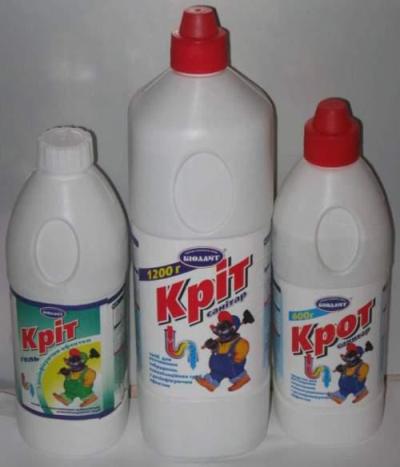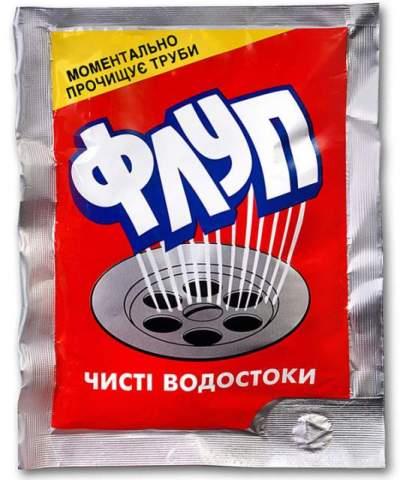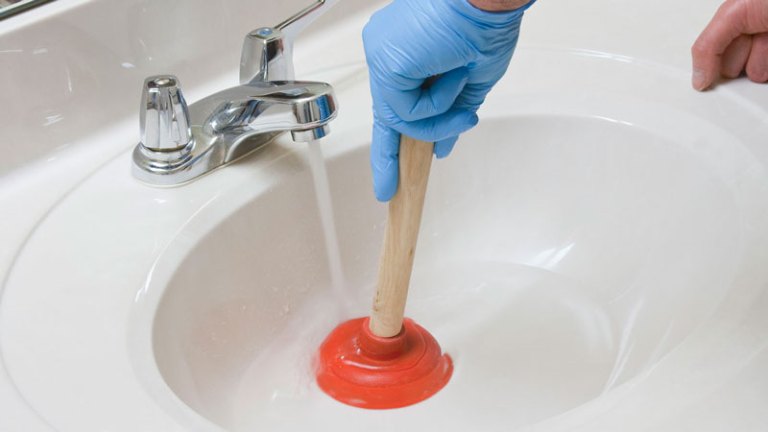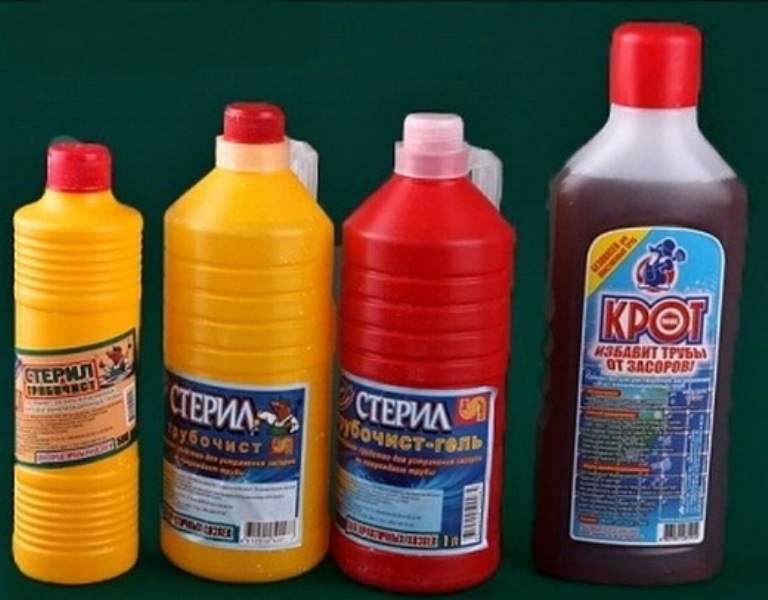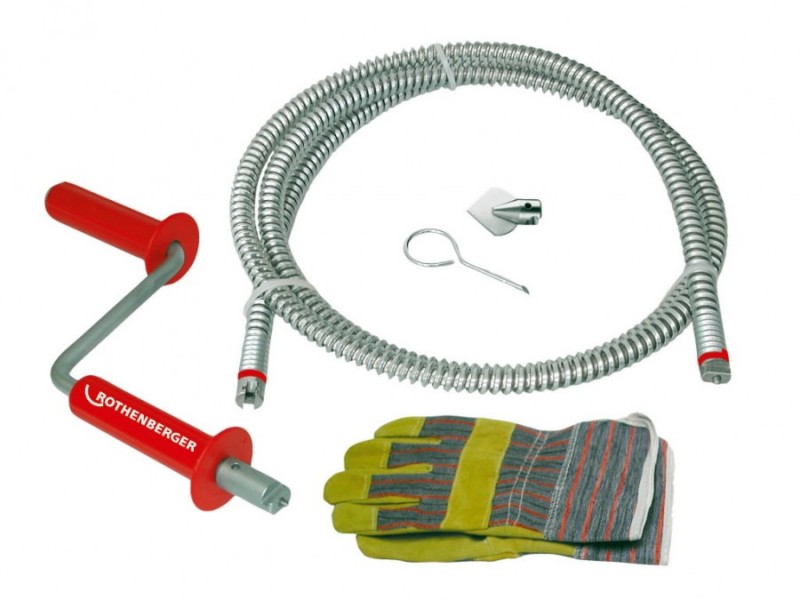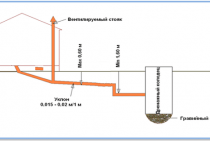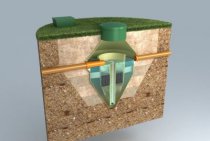Popular chemicals
How to flush sewer pipes? The Mole remedy is known to many families in several generations, since it has been used for a long time. It can be used to remove plugs from hair and threads, fatty organic compounds. Used for all types of sewer pipes. It is also used to prevent blockages.
Liquid remedy - "Mole"
How to clean the sewer pipes in case of a serious blockage? In this case, it is worth using Tiret: it is safe for metal and other types of sewer pipes. The brand line includes products for the prevention of congestion, which makes it much less likely to use a potent and expensive base gel. Country of origin - Poland.
Gel types:
- Professional.
- Turbo.
- Preventive.
The types differ according to the percentage of active substances.
Mister Muscle cleaner
Flushing of sewer pipes is possible with the help of Mister Muskul products. A product that is gentle on sewer pipes, has many positive reviews from consumers. Available in foam and gel. The most effective in case of blockage is foam. The product dissolves organic deposits, eliminates unpleasant odors, destroys bacteria.
You can get rid of blockages in sewer pipes with the help of a chemical agent produced in Israel, Bagi Potkhan.
Causes of blockages removed by the tool:
- Hair.
- Fat.
- Paper.
- Lime scale.
Designed for cleaning metal and plastic pipes. It is recommended to avoid contact with the surfaces of bathtubs, sinks, washbasins, not to mention the skin of humans and animals.
When using this tool, you should be very careful, as the reaction occurs immediately after pouring water. Before pouring the chemical agent, it is necessary to remove 5 cm of water standing in the drain. It is recommended to turn on the hood and open the windows during the cleaning process.
"Bagi Potkhan" - a means of combating blockages
Fluop is available in granules. Types of release funds:
- For pouring hot water.
- For filling with cold water.
Fluop granules, designed for pouring hot water, work much faster. The powder is poured into the drain hole, poured half a glass of hot water (70-80 degrees), aged for some time (according to the inscription on the package) and washed with water in large quantities. Work is done with gloves, carefully avoiding contact with eyes and skin.
Granular
Using chemicals, you not only solve the problem of blockage, but also disinfect the sewer pipeline, getting rid of bacteria and unpleasant odors. For long-term operation of the sewage system without blockages, it is necessary to carry out preventive cleaning using chemicals intended for this.
How to clean sewer pipes from grease at home
As a rule, not only residents of multi-storey buildings are faced with such a problem as sewer blockage, but also owners of private plots with autonomous sewerage.
In fact, sewer clogging is a rather unpleasant phenomenon, since the water stops leaving and an unpleasant smell appears in the premises.
Cleaning sewer pipes from grease at home can be done with your own hands, if the blockage is small.
But if there are volumetric accumulations of fatty deposits in the pipes and it is not possible to thoroughly clean them with available means, then it is better to turn to professionals who, using special equipment, will do the job quickly and efficiently.
Cleaning pipes from grease by professionals
Most people who encounter this problem are wondering how to clean sewer pipes from grease?
Many options can be used. For example, at home, sewer pipes can be cleaned with soda and a plunger.
With more voluminous fat accumulations and blockages, a cable can be used, however, they can damage the pipes if used incorrectly, which will lead the sewer pipe to an emergency condition.
Today, more affordable methods have appeared, in particular, this is an effective chemical agent for cleaning sewer pipes from grease.
Cleaning pipes with baking soda
Popular Clog Remedies
If you are wondering how to clean the sewer from grease, then just go to any hardware store, where on the shelves you will be offered a lot of options for chemicals and mechanical cleaning.
It is worth saying that alkali-based chemicals are perfect for cleaning the sewer system from grease and any blockages, they are all available in granules.
It is alkali that perfectly copes with fatty and soapy deposits on pipes.
It is worth considering in more detail each modern means for cleaning sewer pipes from grease offered to consumers:
Mole - a package with granules. One package is enough for one application, which is very convenient. The cost of this tool is very affordable, one bag costs about 10 rubles. This option is the cheapest
Means for cleaning pipes Mole
Pipe Cleaner Mister Muscle
Pothang Pipe Cleaner
Fluop Pipe Cleaner
Deboucher Pipe Cleaner
Tiret Pipe Cleaner
Pipe Cleaner NoaVita
How to degrease a pipe using NoaVita
When wondering how to flush sewer pipes from grease, you can very quickly and easily find the answer using NoaVita.
So, to carry out the procedure itself, you need to follow a certain sequence:
NoaVita - the best remedy for blockages
- first of all, put on gloves and a respiratory mask, open windows to ensure good ventilation,
- then pour the cleaner into the drain hole,
- we wait 20 minutes, this time is necessary for the product to pass through the system and free it from blockages,
- after the specified time, flush the system with water. 3-4 buckets of water must be poured into the hole so that the chemical agent, along with all the garbage, leaves the sewer pipe.
NoaVita gel remedy
Please note that products presented in the form of a liquid do not require dilution with water. What can not be said about powders and granules that are poured into the drain hole and poured from above with a glass of water
What can not be said about powders and granules, which are poured into the drain hole and poured from above with a glass of water.
If, after the procedure, you notice that the water still does not go well through the pipes or does not go at all, then you should contact the specialists for help.
Professional cleaning of fatty deposits in pipes
Usually, the use of products such as NoaVita is enough to clear the sewer pipe and restore the system to work.
It is necessary to use these products with caution, observe all precautions and adhere to the indicated dosage of the product for one application.
Cleaning at home
If the blockage in the pipes is not too global, then you can deal with it with home methods. Among them:
- Cleaning the system with a plunger.
- Use of household chemicals.
- Cleaning with a plumbing cable.
Using a plunger
Using a plunger - the simplest plumbing tool - cleaning pipes is easy and safe. The work goes like this:
- If there is an overflow hole in the sink, then it must be tightly plugged with a stopper.
- A small amount of water is drawn into the sink.
- Now you need to install the plunger so that its rubber part completely blocks the drain hole.
- Having finished swinging, you need to sharply pull the plunger out of the water.
- If after that the collected water easily went into the drain, then the cleaning of the sewer pipes was successful. Otherwise, you should repeat the operation 1-2 more times.
Chemical cleaning methods
If the water starts to leave the kitchen sink worse, then, most likely, it is necessary to clean the sewer pipes from grease. This can be done using ordinary baking soda or special household chemicals. Cleaning the sewer from grease with soda is carried out as follows:
- A glass of soda is carefully poured into the sink hole, then three glasses of boiling water are poured into the same place. After 2-3 hours, the pipes are washed with water. The resulting alkaline solution perfectly cleans pipes from grease.
- Instead of one soda, you can take a mixture in equal parts (half a glass) of soda and salt. Pour this mixture into the drain, pour boiling water there.
- Having poured soda into the drain, you can pour it not with boiling water, but with ordinary food vinegar. The resulting neutralization reaction between acid and alkali will lead to the dissolution of fatty deposits.
If it is not possible to cope with fat deposits in pipes with soda, you can resort to the use of more effective, but, unfortunately, more aggressive drugs. You can buy a tool for the sewage system in almost any store that presents household goods.
To restore the drain in the sink in the kitchen, chemical cleaning of the sewage system using alkali-based preparations is used. Such agents may be liquid, formulated as a gel or granular powder. Work comes like this:
- To clean the drainage system, it is necessary to pour (fall asleep in case of using a dry agent) a sewer pipe cleaner into the drain of a sink or washbasin.
- If a dry product is used, then after it you need to pour a little water into the hole.
- Let the product work in the pipes, stopping using the sink for a while. The exposure time is indicated in the instructions, it can be from several minutes to several hours. Some products recommend leaving overnight.
If you need to clean the drain in the bathroom or washbasin, you should use an acid-based drain cleaner. It is these products that dissolve the hair well, the accumulation of which, most often, is the cause of clogging of the pipes in this place.
Wire cleaning
If there is no desire to use aggressive chemicals, and manipulations with the plunger do not bring results, then when solving the problem, how to clean the sewer pipes at home, there is only one way out - the use of a plumbing cable.
This name is given to a special device, which is a long (5-10 meters) steel wire, on one side of which a handle is installed on the wire. For greater efficiency, it is recommended to use special nozzles that are attached to the end of the cable that is inserted into the pipe.
When using a cable, cleaning the sewer system in a private house or apartment goes like this:
- The entrance to the sewer pipe opens. This may be a revision hatch or a pipe under the sink, from which the siphon should be removed.
- It is more convenient to work with a cable together. One of the workers will direct the cable, the second will rotate the handle.
- The cable should be advanced along the pipe, pulling it out from time to time to clean it of dirt adhering to it.
Such pipe cleaning equipment, like a cable, allows not only to break through the debris plug, but also to clean the pipes from internal plaque. However, it is quite laborious and dirty. After the integrity of the pipe is restored, you need to rinse the system well with hot water.
3 ways to clean the sewer from grease
Clogging of sewer pipes is a problem that sooner or later every homeowner faces, no matter how carefully he uses all communications. Someone may argue that it is enough not to flush large debris into the drainage system, but fat also causes trouble, which abundantly enters the sewer when washing dishes, cleaning and cooking.
Do pipes need to be cleaned of grease?
Settling on the walls of the sewer, the greasy film gradually becomes more and more thick and viscous. It narrows the lumen of the pipe both by itself and due to the fact that various small washable debris gets stuck in it.
In addition, both the oily residue itself and the food waste remaining there become an excellent breeding ground for bacteria. This is not so much dangerous from the point of view of harm to health as unpleasant, because the pipes begin to smell of rot and rotten meat, they are covered from the inside with a nasty sticky and slimy dark coating.
Therefore, there is only one answer to the question of the need to remove fat - it must be done.
How to clean the sewer from grease in the kitchen or in a private house?
Folk remedies
The easiest way to get rid of a greasy blockage is to resort to soda, a substance that is found in the kitchen of almost every housewife. A few large spoons of soda are poured into the drain, lightly washed with warm water deep into the pipe, and then a couple of tablespoons of vinegar are poured. The carbon dioxide formed during the chemical reaction of these products removes fat deposits from the walls of sewer pipes well.
An alternative to vinegar can be citric acid - it is mixed with soda in a dry state in approximately equal proportions, poured into the drain, then poured with warm water. But such products are good with frequent and regular use and a small degree of clogging. If the pipe is heavily clogged with fat, you will have to resort to more aggressive and effective methods.
Specialized anti-blockage products
In household chemical stores you can find many similar products in liquid, gel or powder form. As a rule, all such products have a complex effect, i.e., they affect both fat and other types of contaminants. This information can always be clarified on the packaging or in the instructions for use. You should look for either a direct indication that the product is effective against fatty blockages, or information about the presence of alkalis in the composition (they dissolve fat).
Among the most famous and common pipe cleaners are Trublon, Mole, Mister Muscle, Potkhan, Tiret and others.
mechanical cleaning
If no chemical methods of dissolving fat have yielded results, it remains to try to clean the sewer manually.
- Remove the drain from the sink or tub.
- Unscrew the siphon (if possible, and the blockage is located behind it).
- They begin to advance the cable deep into the pipe, rotating it in one direction.
- As soon as it gets stuck, and not just not the first time it passes the next turn in the pipe, it should be pulled out, clean the tip and repeat all the steps until the blockage is eliminated.
Preventive measures
It will not be possible to completely protect the pipes from getting fat - after all, there is quite a lot of it on the dishes, and all detergents only help to remove it from there, but not dissolve it. But it is still possible to reduce its number. It is better to pour the oil from the pan or the remains of other fatty foods into an unnecessary container and throw it in the trash. Or at least flush down the toilet, the sewer pipe of which is much wider, and pour warm or hot water to thin the fat.
Proper design of the sewer system will also help minimize the likelihood of such blockages. This implies the selection of the optimal diameter of the pipes and their location under an average slope (5-10 cm per meter of length). With a smaller slope, all waste washed into the sewer will stagnate, with a much larger slope, the drains will begin to delaminate.Water, as the lightest substance, will rise to the top and drain quickly, grease and other contaminants will settle against the walls, quickly clogging the pipe.
Professional help with complex blockages
In most cases, the methods listed above are effective, but this is not always the case. If it was not possible to solve the problem on your own, it's time to invite specialists. To begin with, they will conduct video diagnostics of the state of the sewer system, in parallel, finding out not only the location and nature of the blockage, but also the general condition of the pipeline. Then one of the following methods will be applied:
- hydrodynamic method, in which a high-pressure jet of water is supplied to the sewer;
- thermochemical cleaning using special products heated to a high temperature;
- pneumohydropulse sewerage cleaning by transmitting a high power second impulse action through the system.
Thanks to modern equipment, the teams cope with the blockage in the shortest possible time.
You should not think that such a nuisance as a clogged sewer is possible only where sloppy people live. In fact, operational blockages are also common, that is, resulting from the normal use of sewage. The composition of the drains includes fat, litter, sand, hair, they can greatly narrow the lumen of the pipe and reduce its throughput. To remedy the situation, it is necessary to clean the pipes. With small blockages, you can deal with the problem yourself, but in some cases it is more profitable to turn to the services of professionals.
Sewer blockage is a nuisance. The water stops leaving, a disgusting smell appears in the rooms. Naturally, such a situation cannot be considered normal, and urgent measures must be taken to eliminate the accident.
I must say that the cleaning of sewer pipes can be entrusted to professionals. In this case, a special pressure station and special cleaning methods will be used. But if the blockage is small, then it is quite possible to manage on your own. Consider what methods can be used for cleaning.
Use of household chemicals
Effective cleaning of sewer pipes is also successfully performed using special gels or powders. You just need to carefully read the instructions and follow the manufacturer's instructions exactly. Usually the procedure is to pour the powder or pour the gel into the drain hole and wait a while.
If, after the time specified by the manufacturer, the accumulated water has not begun to decrease, you should use a plunger. A few vigorous strokes will help clear blockages that have already been attacked by chemicals.
If such tools for quick cleaning of sewer pipes are not available for some reason, you can use substances that can be easily found in any kitchen. The easiest option: pour a couple of liters of boiling water into the drain hole. Sometimes this is enough to dissolve the fatty plug. And in general, as a preventive measure for operational blockages, it is recommended to pour boiling water into the sewer every time after washing very greasy dishes. Fat will be more efficiently washed off the walls of the sewer pipe and the likelihood of blockage will be significantly reduced.
Ordinary baking soda allows you to create an alkaline environment in the pipes, dissolves blockages and disinfects the pipeline from the inside. It is also used in combination with vinegar, salt and other substances.
There are several recipes on how to clean a clogged sewer pipe with baking soda. Ordinary baking soda is effectively used in combination with vinegar, salt and other substances.
Soda and boiling water
Procedure:
- First you need to pour about a liter of boiling water into the sewer.
- After a quarter of an hour, try to clean the drain with a plunger.
- Then pour a glass of baking soda and pour three more glasses of boiling water.
If necessary, this procedure can be repeated several times. An alkaline environment is formed in the sewer, which will not only dissolve the blockage, but also disinfect the walls of the sewer pipes.
soda and salt
Procedure:
- Baking soda and table salt are mixed in equal proportions, for example, in half a glass.
- The mixture is poured into the drain hole.
- Pour about 1 liter of boiling water.
After that, you need to let the mixture work for about 8-12 hours. During this period, it is not recommended to use the sewer.
soda and vinegar
Procedure:
- First, half a glass of soda is poured into the drain hole.
- Then pour in about the same amount of vinegar.
- The drain hole is closed with a stopper.
- After about two hours, about a liter of boiling water is poured into the sewer.
Please note that when alkali (soda) and acid (vinegar) are combined, a large amount of foam is formed and carbon dioxide is released
Do I need to clean the sewer from grease?
Regardless of the material from which the sewer is made, fat quickly sticks to the inner walls with a continuous sticky layer.
Small household and food waste, which also fall into the sewer, stick to this film, forming fairly strong blockages. In cast iron pipes, the hole can be clogged by loose scale, which is removed only mechanically.
Fat is a favorable environment for the rapid development of various bacteria that globally violate the sanitary condition of the kitchen and smell very bad.
If an unpleasant stagnant smell appears near the washstand in the kitchen, it is necessary to clean and sanitize the sewer.
Cesspool cleaner
Decomposes waste in pit latrines6 months
Composite Formula K-47 with high enzymatic activity ensures uninterrupted operation of the sewer system in 6 months. Increases the periods between pumpings, prevents unpleasant odors.
The products are manufactured using original Roebic Lab active ingredients. USA.
Means for maintenance of cesspools of country toilets. Cesspools require regular cleaning due to the accumulation of organics, feces, paper, detergents and various chemicals. This leads to overfilling of the tanks, the appearance of an unpleasant odor, poor drainage, and subsequent silting of the system. The use of Roetech K-47 eliminates the above problems by quickly breaking down organic waste and other contaminants. Significantly reduces the volume of solid fractions. Eco-friendly, safe
Recommendations for use
1. Shake the bottle well. 2. Pour the contents into the cesspool. 3. Add water if the sump is dehydrated.
Repeat 2 times a year or as needed. A 946 ml bottle serves a 2 m3 reservoir.
Safe for people, animals, plants.
Keep away from children. Do not take internally.
Decomposes grease, soap, paper in latrines and septic tanks
High Power Formula K-87 is specifically formulated to break down fats to prevent silting up of pit latrines, drains and septic tanks.
The products are manufactured using original Roebic Lab active ingredients. USA.
Grease, soap, paper dissolver, part of the Roebic sewer care program, special agent for the decomposition of soap, grease, paper. Roetech K-87 can be used effectively in the maintenance of water recycling systems to dissolve soap, grease and paper in septic tanks and sewers and to restore normal operation of drain pipes by cleaning them of buildup of soap and detergents.
Aqueous suspension based on bacteria of the genus Bacillus subtilis, Bacillis macerans, Bacillus amyloliquefaciens and Bacillus pumilis that decompose environmentally harmful waste. These bacteria are not pathogenic for humans, animals and plants.
Recommendations for use
1. Shake the bottle well.2.For drains and risers: For one application, dilute 230 ml of product with 350 ml of warm (not hot) water and pour into a sink or bath. Do not use the system for 6-8 hours. Repeat 4-8 nights in a row.
For septic tanks and drainage fields: Pour the contents down the toilet and flush once. Repeat 4 times a year or as needed.
For best results, apply at night. Do not pour into washing machine or dishwasher!
A 946 ml bottle serves a 2 m3 reservoir.
Safe for people, animals, plants.
Keep away from children. Do not take internally.
